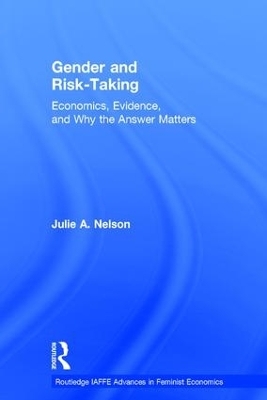
Gender and Risk-Taking
Routledge (Verlag)
978-1-138-28401-2 (ISBN)
Gender and Risk Taking makes three contributions. First, it asks whether the belief that men and women have distinct risk preferences is backed up by high quality empirical evidence. The answer turns out to be "no." This leads to a second question: Why, then, does so much of the literature claim to find evidence of "difference"? This, it will be shown, can be attributed to biases arising from too-easy categorical thinking, widespread stereotyping, and a tendency to prefer results that are publishable and that fit one’s prior beliefs. Third, the book explores the economic implications of the conventional association of risk-taking with masculinity and risk-aversion with femininity. Not only fairness in employment, but also the health of the financial sector and national responses to climate change, this book argues, are being compromised.
This volume will be eye-opening for anyone interested in gender, decision-making, cognition, and/or risk, especially in areas relating to employment, finance, management, or public policy.
Julie A. Nelson is Professor of Economics at the University of Massachusetts Boston and Senior Research Fellow at the Global Development and Environment Institute at Tufts University, USA.
Dedication
List of Figures and Tables
Acknowledgements
Introduction
Part I. To Understand the Answer, You First Have to Have a Clear Question
Chapter 1. The Better Question: How Much Different and How Much Similar
Chapter 2. Why We Get Stuck on the Bad Question
Chapter 3. Statistical Tools for Analyzing Similarity and Difference
Chapter 4. Statistical Tools for Inference and the Detection of Bias
Part II. Evidence about Risk Behavior: Little Difference, Much Similarity
Chapter 5. Difference and Similarity in 35 Scholarly Works
Chapter 6. Difference and Similarity in 37 Investment Game Studies
Part III. Evidence about Stereotyping and Confirmation Bias: Rampant
Chapter 7. Stereotyping and Research Participants
Chapter 8. Confirmation Bias Among Researchers in 35 Scholarly Works
Chapter 9. Confirmation Bias and the Review of 37 Investment Game Studies
Part IV. Why It Matters
Chapter 10. Presumed Timidity: Consequences for Women
Chapter 11. Recklessness: The (Masculine) Gendering of Commerce and Finance
Chapter 12. Fearing Fear: The (Masculine) Gendering of Economics and Policy
Conclusion
Index
| Erscheinungsdatum | 13.07.2017 |
|---|---|
| Reihe/Serie | Routledge IAFFE Advances in Feminist Economics |
| Zusatzinfo | 8 Tables, black and white; 20 Line drawings, black and white; 20 Illustrations, black and white |
| Verlagsort | London |
| Sprache | englisch |
| Maße | 156 x 234 mm |
| Gewicht | 453 g |
| Themenwelt | Geisteswissenschaften ► Psychologie ► Allgemeine Psychologie |
| Sozialwissenschaften ► Soziologie ► Gender Studies | |
| Wirtschaft ► Volkswirtschaftslehre ► Wirtschaftspolitik | |
| ISBN-10 | 1-138-28401-7 / 1138284017 |
| ISBN-13 | 978-1-138-28401-2 / 9781138284012 |
| Zustand | Neuware |
| Haben Sie eine Frage zum Produkt? |
aus dem Bereich


